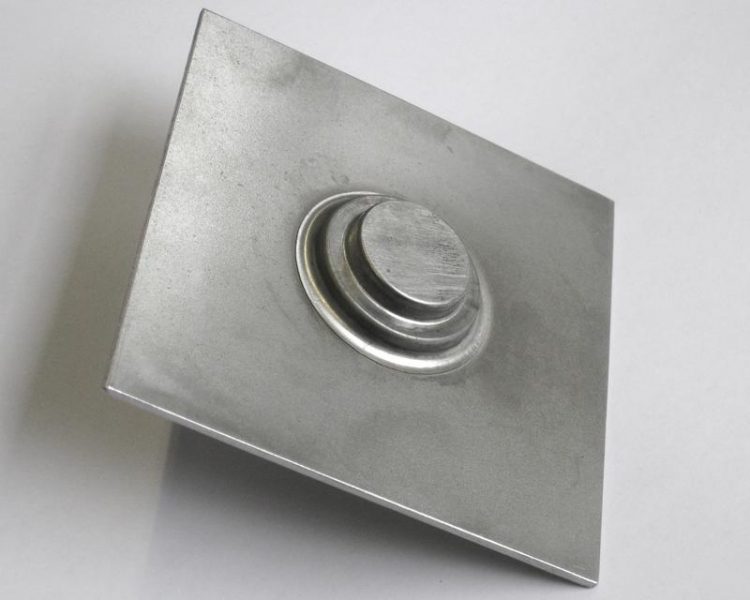Scientists from Hannover develop a novel lightweight production process

Hybrid compound forging: The novel lightweight production process firmly bonds bulk aluminium parts to steel sheets – already during the forming process without an extra joining step. Photo: IPH
Hybrid compound forging is the first process that combines two lightweight construction approaches, namely creating a material bond between steel sheets and bulk parts, and employing different materials with different properties – such as lightweight aluminium and strong steel.
The researchers' idea is to form and join a steel sheet and a solid aluminium stud in one process step. In the past, the individual parts have been formed first and then joined in a second step, for example using stud welding. The idea of hybrid compound forging is to eliminate the subsequent joining step – and facilitate a faster and more efficient production of lightweight components.
When designing the novel lightweight production process, IPH and ISAF have to meet two challenges: Since aluminium has a considerably lower melting point than steel, the joint forming process is more complicated.
Moreover, the mixing of steel and aluminium creates brittle intermetallic phases, a material bond which is not strong enough and thus unsuitable for car manufacture. For this reason, the researchers employ zinc-plated steel sheets and aluminium studs: Zinc firmly bonds to aluminium as well as to steel without creating brittle phases.
Within the scope of the research project “Hybrid Compound Forging”, the researchers' task is to determine the most suitable process conditions – i.e. optimal temperature, pressure and speed for successfully forming and joining the two parts.
They also try to identify the suitability of the novel process with respect to different types of sheet thicknesses and stud shapes. Another topic is to determine the joining zone's capacity to withstand load as well as the machinability of the hybrid part after joining.
In future, hybrid compound forging could be used in the automotive and aerospace industry to produce components, such as longitudinal beams, tail lamp mounts or cargo tie-down rings. Lightweight construction plays an important role in the automotive and aerospace sector: Lesser weight means lower fuel consumption.
Over the years, the Institut für Integrierte Produktion Hannover (IPH) gGmbH has already been dealing with various lightweight approaches in sheet and bulk metal forming, like for example cross wedge rolling and hydroforming of hybrid steel and aluminium parts.
The researchers have already succeeded in combining sheet and bulk metal parts of different materials in one single forming step – but only as a prototypic form-fit connection between steel sheet and aluminium stud. In the current research project “Hybrid Compound Forging”, the researchers are going for a material bond using zinc as filler material which also offers advantages as to contact corrosion in the steel-aluminium material combination.
The project is funded by the German Research Foundation (DFG).
Media Contact
More Information:
http://www.iph-hannover.deAll latest news from the category: Machine Engineering
Machine engineering is one of Germany’s key industries. The importance of this segment has led to the creation of new university degree programs in fields such as production and logistics, process engineering, vehicle/automotive engineering, production engineering and aerospace engineering among others.
innovations-report offers informative reports and articles covering technologies such as automation, motion, power train, energy, conveyor, plastics, lightweight construction, logistics/warehousing, measurement systems, machine tools and control engineering.
Newest articles

NASA: Mystery of life’s handedness deepens
The mystery of why life uses molecules with specific orientations has deepened with a NASA-funded discovery that RNA — a key molecule thought to have potentially held the instructions for…

What are the effects of historic lithium mining on water quality?
Study reveals low levels of common contaminants but high levels of other elements in waters associated with an abandoned lithium mine. Lithium ore and mining waste from a historic lithium…

Quantum-inspired design boosts efficiency of heat-to-electricity conversion
Rice engineers take unconventional route to improving thermophotovoltaic systems. Researchers at Rice University have found a new way to improve a key element of thermophotovoltaic (TPV) systems, which convert heat…



